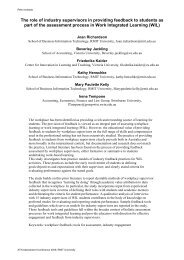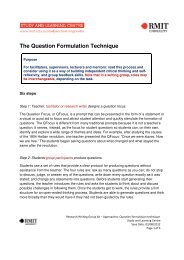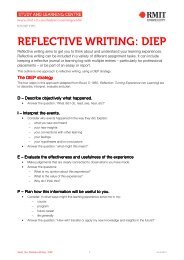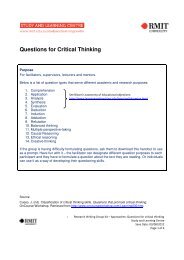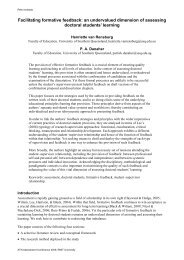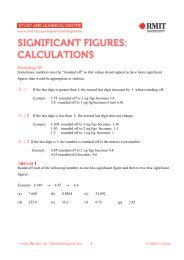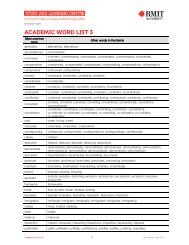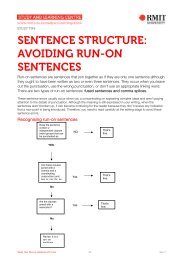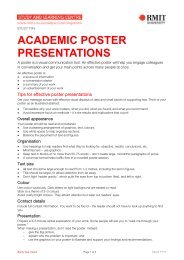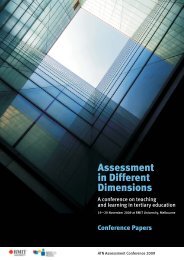student feedback and leadership - Office for Learning and Teaching
student feedback and leadership - Office for Learning and Teaching
student feedback and leadership - Office for Learning and Teaching
Create successful ePaper yourself
Turn your PDF publications into a flip-book with our unique Google optimized e-Paper software.
Part B: Building Leadership Capacity - DSC: Property, Construction & Project Management ART Report<br />
9.11 Evaluation of the ART Project<br />
The results flowing from the ART project must be seen against a background<br />
of continuous improvement in learning <strong>and</strong> teaching to which the School<br />
aspires. The distributed <strong>leadership</strong> component was successful with respect<br />
to a number of staff members. This factor was not successful with regard<br />
to <strong>student</strong>s. The <strong>student</strong>s consulted had no <strong>leadership</strong> aspiration with regard<br />
to learning within the School <strong>and</strong> exhibited a general disinterest of all such<br />
matters. The <strong>student</strong> <strong>feedback</strong> component of the ART project was successful<br />
with regard to improvement of facilities <strong>and</strong> of a more general nature. Other<br />
worked planned could not be undertaken in full due to the non availability<br />
of suitable learning spaces. The increase in CES of the relevant course bore<br />
testament to this conclusion. Some of the wider benefits of the ART project<br />
are displayed in the firm establishment of the <strong>Learning</strong> <strong>and</strong> <strong>Teaching</strong><br />
Committee <strong>and</strong> the work it will do in the future.<br />
9.12 Recommendations<br />
School<br />
The overall success of the ART project indicates that such small-scale projects<br />
with very specific aims are a very useful mechanism <strong>for</strong> future learning <strong>and</strong><br />
teaching developments in the School. Small projects could be put <strong>for</strong>ward<br />
by the <strong>Learning</strong> <strong>and</strong> <strong>Teaching</strong> Committee <strong>for</strong> particular small teams of staff<br />
to undertake. Alternatively teaching staff should be encouraged to put<br />
<strong>for</strong>ward their own ideas <strong>for</strong> investigation <strong>and</strong> development if warranted.<br />
College / University wide:<br />
Clearly, these types of school based initiatives are applicable to other areas<br />
within RMIT.<br />
9.13 Selected References<br />
Boyer, E. (1990). Scholarship reconsidered: Priorities of the professoriate. USA:<br />
Princeton Press.<br />
Chism, N. (2006). 'Challenging traditional assumptions <strong>and</strong> rethinking learning'.<br />
In Oblinger (Ed.), <strong>Learning</strong> spaces. USA: Educause.<br />
Fisher, K. (2005). 'The evolution of the hybrid campus'. TEFMA Seminar,<br />
March. Australia: QUT.<br />
Garrison, D. <strong>and</strong> Anderson, T. (2003). E-lecturing in the 21st century. USA:<br />
Routledge Falmer.<br />
Page 131



